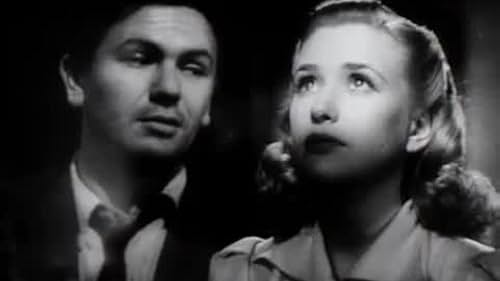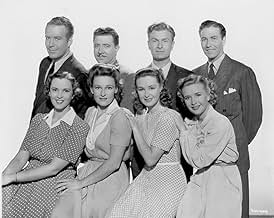Lola Lane(1906-1981)
- Actress
- Soundtrack
Lola Lane, born Dorothy Mullican, grew up Indianola, Iowa. Small-town
life was not to her taste and she yearned to be in show business. She
was also a bit of a rebel. At one time, in her teens, she 'scandalized' the
townsfolk by dancing a particularly suggestive Charleston right in
front of the church--which was emptying after Sunday service.
She secured her first job playing piano accompaniment to silent films in the local movie theater for seven dollars a week. She then worked briefly in an ice cream factory, but soon had enough and quit, leaving for Des Moines (in accordance with her mother's dictates) to study music. She spent two years at the local conservatory, Simpson College, but--still the rebel--cut classes and was expelled, much to her joy. There are several versions as to what happened next: according to one, her sister Leota Lane was "discovered" by vaudevillian Gus Edwards (who was always scouting for talented youngsters) singing in an Iowa theater. Dorothy then chaperoned Leota on her trip to New York and both girls subsequently appeared in "Greenwich Village Follies" on Broadway. According to the New York Times obit of Lola Lane (June 25, 1981), Edwards discovered her "singing in a flower shop in Des Moines". Dorothy herself claimed that she wrote Edwards in New York, borrowed $200 and went to his house for an audition.
Whichever story is true, Dorothy ended up with a $450-a-week vaudeville contract. Around this time, she and her other sisters (Leota, Martha, Rosemary and Priscilla) changed their surname. Dorothy Mullican became Lola Lane. She toured with Gus Edwards in "Ritz Carlton Nights" and in 1928 appeared in "The War Song" on Broadway. During one of her performances, she was spotted by Benjamin Stoloff who was conducting auditions for a part in his movie Speakeasy (1929). Needless to say, she got the part.
While never becoming as big a star as her sister Priscilla Lane, Lola had a fairly successful career in the movies. She won critical acclaim for her performance in Marked Woman (1937) as a hard-boiled night club hostess and was rewarded with a contract at Warner Brothers. She continued to play similar characters in films like Gangs of Chicago (1940), as well as appearing in occasional "potboilers" like Zanzibar (1940). Lola also played female reporter Torchy Blane (Torchy Blane in Panama (1938)), which served as inspiration for Superman's girlfriend Lois Lane. Lola retired from the screen in 1946.
She secured her first job playing piano accompaniment to silent films in the local movie theater for seven dollars a week. She then worked briefly in an ice cream factory, but soon had enough and quit, leaving for Des Moines (in accordance with her mother's dictates) to study music. She spent two years at the local conservatory, Simpson College, but--still the rebel--cut classes and was expelled, much to her joy. There are several versions as to what happened next: according to one, her sister Leota Lane was "discovered" by vaudevillian Gus Edwards (who was always scouting for talented youngsters) singing in an Iowa theater. Dorothy then chaperoned Leota on her trip to New York and both girls subsequently appeared in "Greenwich Village Follies" on Broadway. According to the New York Times obit of Lola Lane (June 25, 1981), Edwards discovered her "singing in a flower shop in Des Moines". Dorothy herself claimed that she wrote Edwards in New York, borrowed $200 and went to his house for an audition.
Whichever story is true, Dorothy ended up with a $450-a-week vaudeville contract. Around this time, she and her other sisters (Leota, Martha, Rosemary and Priscilla) changed their surname. Dorothy Mullican became Lola Lane. She toured with Gus Edwards in "Ritz Carlton Nights" and in 1928 appeared in "The War Song" on Broadway. During one of her performances, she was spotted by Benjamin Stoloff who was conducting auditions for a part in his movie Speakeasy (1929). Needless to say, she got the part.
While never becoming as big a star as her sister Priscilla Lane, Lola had a fairly successful career in the movies. She won critical acclaim for her performance in Marked Woman (1937) as a hard-boiled night club hostess and was rewarded with a contract at Warner Brothers. She continued to play similar characters in films like Gangs of Chicago (1940), as well as appearing in occasional "potboilers" like Zanzibar (1940). Lola also played female reporter Torchy Blane (Torchy Blane in Panama (1938)), which served as inspiration for Superman's girlfriend Lois Lane. Lola retired from the screen in 1946.

































